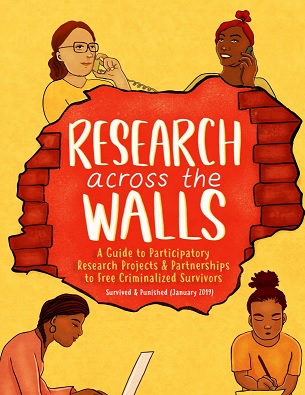Resources Library: Publications/Reports
Start a Search:
Research Across the Walls: A Guide to Participatory Research Projects & Partnerships to Free Criminalized Survivors

For many survivors, experiences of policing, criminalization, and incarceration are deeply intertwined with gender-based violence. Yet very little research exists about criminalization of survivors. With this research guide, we aim to equip more people with tools, resources, ideas, and models to pursue urgently needed community-based research projects. We hope this guide inspires more organizers, advocates, attorneys, scholars, and survivors — especially those who are currently and formerly incarcerated — to lead research projects that will contribute to a growing body of data and information to fight for the freedom and well-being of criminalized survivors, and of all people.
Resource Guide: Combating Violence Against Women
This Resource Guide was developed by the Department of Homeland Security Council on Combating Violence Against women and includes summaries and links to programs, initiatives, training, and services that can be leveraged by communities across the country to combat these types of crimes. For foreign victims, immigration relief stabilizes a victim’s status in the U.S., which enables the victim to feel a level of security and report the crime. This Resource Guide provides an overview of immigration relief and support for victims.
Resources from the National Center on Elder Abuse
The National Center on Elder Abuse (NCEA) has collected all of its products (reports, webinars, podcasts, databases, etc.) in one location for easy access and availability.
Click the following links for more information on:
Elder Rights Resources - Prevention of elder abuse, legal assistance, world elder abuse awareness, and more
NCEA publications - These include information on LGBT elder concerns, financial abuse and exploitation, culturally-specifc resources, persons with disabilities, and more
Virginia-specifc state resources for elders
Supports and Tools for Elder Abuse Prevention
The Reframing Elder Abuse Project - a communications strategy and toolkit that reimagines our cultural dialogue on elder abuse
Rural and Tribal Elder Justice Resource Guide: Summit Event Briefing
Summit Event Briefing
November 14-15, 2018
Marriott Downtown 700 Grand Ave.
Des Moines, Iowa
On June 15, 2018, the United States Department of Justice and Department of Agriculture committed to working together to promote elder justice in rural and tribal communities. Elder justice refers to a society’s response to elder abuse, which includes physical abuse, caregiver neglect, financial exploitation, psychological abuse, sexual abuse, and abandonment. Each year in America, at least 10% of older adults (age 60 or older) experience one or more forms of elder abuse. This is unacceptable.
The goal of the Summit and subsequent activities is to enhance the ability of elder justice professionals to more robustly respond to the unique needs of older adults residing in rural and tribal communities by sharing best practices and proposing innovative strategies to fill the identified gaps in service needs, all with the goal of enhancing the lives of older Americans everywhere.
SAFE RETURN: Working Toward Preventing Domestic Violence When Men Return from Prison
The Safe Return Initiative focuses on strengthening domestic violence services for African American women and their children when they are facing the return of an intimate partner from prison. It does this by building culturally specific technical capacity within and cooperation among justice institutions and community-based and faith-based organizations. Its goals are to keep women and their children safe and improve the odds of successful reentry by offering peer-based learning, training, information sharing, and on-site assistance designed to help criminal justice and community-based
organizations better serve African Americans dealing with prisoner reentry.

